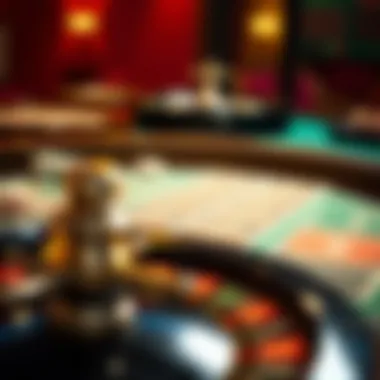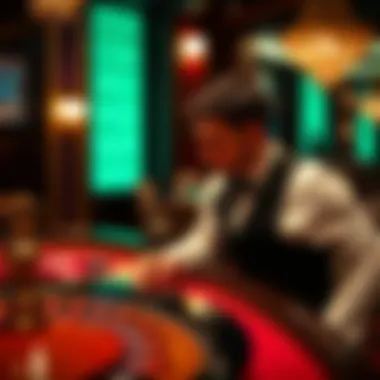The Intricacies of Casino Roulette: A Deep Dive


Intro
Roulette stands out in the pantheon of casino games, captivating enthusiasts with its mix of chance and strategy. Its origins can be traced back to 17th century France, where it began its journey as a simple betting game before evolving into the enticing spectacle we know today. Each spin of the wheel is a blend of anticipation and thrill, drawing players from all walks of life to its polished tables.
Often dubbed the "game of kings," roulette is not just about betting; it’s about understanding the intricacies of the game itself. The allure lies not only in the chance of a big win but also in the rich tapestry of history that surrounds it. Gamblers must navigate various betting strategies and approaches, making informed decisions based on their grasp of the odds. This journey through roulette isn’t merely about luck; it’s a compelling examination of human psychology at play. Factors like risk tolerance and the desire for control can significantly influence one’s experience at the table.
As we delve deeper into roulette, we’ll uncover different strategies designed to enhance your game, explore the latest industry insights, and discuss how technology is reshaping the gambling landscape. This guide serves as both a roadmap for newcomers eager to learn the basics and a source of sophisticated insights for seasoned players aiming to refine their craft. Let's spin the wheel of knowledge together.
Intro to Casino Roulette
When it comes to the glitzy world of casinos, roulette stands out as one of the most evocative games. It’s not merely a game of chance but a spectacle that combines strategy, psychology, and a touch of glamour. Understanding the fundamentals of casino roulette sets the stage for grasping its complexities, appealing not just to novices, but also seasoned gamblers looking to elevate their gameplay.
Historical Context
Roulette's origins are steeped in mystery, but most scholars agree that the game traces back to 18th century France. The word itself comes from the French word for 'little wheel'. Initially a simple diversion enjoyed by the nobility, the game gradually morphed into the casino staple we know today. The introduction of the spinning wheel created an engaging visual spectacle–symbolizing fortune's fickle nature.
Despite its French roots, roulette made its way across Europe and even found a place in the Americas. This journey contributed to its evolution, leading to distinct varieties, including the American and French versions, each bringing with them unique rules and house edges.
The practical mechanics of roulette, such as the red-and-black color scheme and the numbered pockets, have their own fascinating lineage. These features were deliberately designed to enhance the game's appeal and to create a fair yet thrilling experience for players.
Cultural Significance
Roulette transcended its gaming roots to become a cultural phenomenon. It appears in films, literature, and even music, embodying the allure of risk and the thrill of chance. Images of players seated at the green felt table, whiskey in hand, are ubiquitous in casino narratives. Through these portrayals, roulette has become synonymous with high-stakes drama, and its symbolic power reflects broader societal attitudes towards luck and fate.
Moreover, roulette has managed to capture the imagination of different cultures. In America, it represents glamour and excitement, while in Europe, it evokes sophisticated traditions and historic elegance. Its cultural significance goes beyond casinos; it's often regarded as an iconic representation of gambling itself, a testament to humanity's ever-present flirtation with risk and reward.
"From rolling dice to spinning wheels, the allure of games is often tied to our hope for fortune and escape."
The depths of roulette extend far beyond the playing table; understanding its historical significance can enrich one's appreciation of the game, offering insights into human behavior, decision-making, and the relationship we have with uncertainty. It serves as a bridge between the past and present, ensuring its place in the heart of casino culture.
Understanding Roulette Mechanics
Understanding the mechanics of roulette is essential for anyone looking to grasp this iconic game. The complexities of roulette are not just in its rules, but also in the subtle interplay of chance, strategy, and psychology that keeps players enthralled. When you understand how the game operates, it allows you to make informed decisions that could enhance your playing experience.
Roulette Wheel Components
The roulette wheel is more than just a spinning contraption; it’s a carefully designed instrument with a blend of science and artistry. It consists of an outer ring of numbers and a central spinning disc. The numbers usually range from 1 to 36 and are alternately colored red and black, punctuated occasionally by the green-colored zero or double zero, depending on the variant. Each ball that cascades down the wheel creates a small universe of possibilities.
Here are the key components:
- Wheel: The structure where the numbers are arranged in a non-sequential order that confounds statistical predictions.
- Ball: The small object that rolls around and determines the winning number when dropped onto the wheel.
- Pockets: These are the compartments where the ball lands, each corresponding to a number and color.
- Table Layout: Surrounding the wheel, this is where players place their bets.
Understanding each part of the wheel can help players visualize the outcome of the spin and appreciate the randomness involved.
Betting Layout Explained
The betting layout is another crucial aspect of the game. It serves as a visual representation of the various betting options available. Players can place bets directly on numbers, combinations, or even colors. This layout creates an organized structure that assists in tracking bets and calculating outcomes.
Some important elements of the betting layout include:
- Inside Bets: These are wagers placed directly on specific numbers or a small group of numbers. Typical inside bets include straight bets (on a single number), split bets (on two adjacent numbers), and street bets (on three numbers in a row).
- Outside Bets: Here, the bets are placed on broader categories, enhancing the odds of winning. They can include red or black colors, odd or even numbers, and ranges from 1-18 or 19-36.
- Call Bets: Unique to certain variants, these bets allow players to wager on groups of numbers based on their positions on the wheel, rather than the layout.


A solid understanding of this layout not only empowers players but also optimizes their betting strategies.
Types of Bets
In roulette, the types of bets you can place can dramatically affect your winnings and gaming experience. Each bet carries unique payout rates and risks. Being aware of these different types is paramount for an effective strategy.
- Straight Bet: This is placing a bet on a single number. Winning offers a payout of 35 to 1. It’s high risk but potentially high reward.
- Split Bet: Betting on two adjacent numbers; if either wins, the payout is 17 to 1.
- Street Bet: Placing a bet on three consecutive numbers along a single row, with a payout of 11 to 1.
- Corner Bet: This involves wagering on four numbers that meet at a corner. Winning yields a payout of 8 to 1.
- Column Bet: Here, players bet on one of the three columns of numbers. The payout is 2 to 1.
- Dozen Bet: Betting on the first, second, or third set of twelve numbers, with a payout also at 2 to 1.
- Even Money Bets: These include bets placed on red or black, odd or even, and low or high. The payout is 1 to 1 and offers a better chance of winning but lower payouts.
Knowing the types of bets can significantly influence how one plays and approaches roulette.
"To win at roulette, analysis and understanding are just as crucial as luck."
By diving into the mechanics, wheel components, and betting strategies, players gain a profound sense of the roulette landscape, empowering them to stake their bets decisively.
Variations of Roulette
Understanding the different variations of roulette is paramount for anyone delving into the world of this iconic casino game. Each variant offers unique rules, layouts, and house edges, creating distinct experiences for players. The variations not only impact the strategies employed but also the potential winnings. Familiarizing oneself with these nuances can significantly influence a player’s approach and enjoyment. In this section, we explore the major types of roulette, highlighting their individual characteristics and offering insights into how they cater to varying player preferences.
European Roulette
European roulette is probably the most widely recognized variant, known for its simplicity and elegant gameplay. This variant features a wheel with 37 pockets, numbered from 0 to 36. One key aspect that sets it apart is the single zero slot, which reduces the house edge to about 2.7%.
- Gameplay Mechanics: Players can place a range of bets, including simple bets on red or black, even or odd, as well as more complex bets covering dozens or columns.
- House Edge: The lower house edge makes this variation more favorable for players when compared to others.
Many seasoned gamblers prefer European roulette due to the enhanced odds afforded by the single zero. The design of the wheel is also aesthetically pleasing, adding to the overall allure of this version.
American Roulette
In stark contrast to its European counterpart, American roulette features an additional double zero pocket, bringing the total number of pockets to 38. This slight modification has significant implications:
- Increased House Edge: The presence of both a single and a double zero escalates the house edge to approximately 5.26%. This makes it less advantageous for players, especially in long-term play.
- Betting Options: Like European roulette, players can make numerous types of bets, however, the added double zero changes the odds on many of these options.
American roulette enjoys popularity due to its edge in excitement and appeal. The stakes often seem higher, and its presence in pop culture further fuels interest.
French Roulette
French roulette is very similar to European roulette, sharing the same wheel layout with 37 pockets. However, it introduces some unique rules that can be appealing to players:
- La Partage Rule: When players bet on even money bets and the ball lands on zero, half their bet can be reclaimed. This effectively lessens the house edge on these bets, making it a compelling choice.
- En Prison Rule: If the ball lands on zero, players have the option to place their bets 'in prison' for the next spin. If they win on that next turn, they regain their original bet.
These rules can enhance the overall experience and offer more favorable conditions for strategic play compared to the other variants.
Other Variations
Beyond the big three, several other variations of roulette exist, catering to niche segments in the gambling community.
- Mini Roulette: Also referred to as "small roulette," features only 13 spaces on the wheel (numbers 1 to 12 plus a single zero). The gameplay is quicker, with a unique betting system.
- Multi-Wheel Roulette: This modern twist allows players to bet on multiple wheels simultaneously, increasing the pace of the game and the potential winnings.
- Live Dealer Roulette: With the rise of online casinos, this version brings the authentic casino atmosphere right to player’s homes, connecting them with real dealers via streaming.
These variations can serve different player preferences, making roulette a versatile game suitable for various skill levels and gaming styles.
"In roulette, knowledge is as valuable as luck. Understanding the variations can lead to more informed decisions and improved outcomes."
Diving into the world of roulette variations enriches the gaming experience, providing avenues for both newbies and veterans alike to explore. Different rules mean different strategies and play styles, ultimately making the gaming floor or online table a buzz of excitement.


Strategic Approaches to Roulette
When it comes to casino roulette, having a tactical mindset can set players apart. Roulette's allure is not simply in chance; strategic approaches offer various pathways to enhance the game experience. Recognizing the mechanics behind the wheel and the bets is critical, but layering in strategies introduces a dimension that can potentially maximize wins or minimize losses. This article will delve into different avenues of strategic thinking, inviting players to navigate this complex landscape more effectively.
Understanding House Edge
The house edge is a fundamental concept that every roulette player needs to grasp. Essentially, it's the mathematical advantage that the casino has over the players. For instance, in European roulette, the house edge is approximately 2.7%. While that may sound marginal, it's significant over the long haul. This edge means that for every $100 bet, the house can expect to make about $2.70 in profit on average.
The importance of understanding this figure lies in how one approaches betting; knowing the rules of the game and this intrinsic edge can help a player adjust their strategies accordingly. By grasping the implications of house advantage, a player can make informed choices about which bets to place, how much to wager, and when to walk away. It steers the player towards a sensible gambling philosophy based on realistic expectations rather than unfounded optimism.
Popular Betting Systems
When players approach roulette, a range of betting systems often comes to the forefront. Each system brings its own flavor of strategy, appealing to different types of players. Here’s a closer look at some of the most renowned:
Martingale Strategy
The Martingale strategy is perhaps the most recognizable system among gamblers. The core principle is simple: whenever you lose a bet, you double your wager on the next round. This approach relies on the belief that eventually, luck must turn back in your favor. What sets Martingale apart is its straightforwardness and the theoretical promise of recovering losses swiftly.
However, there are drawbacks. A key characteristic of the Martingale is that it requires a substantial bankroll. Without ample funds or an infinite series of spins, a run of bad luck can quickly deplete your resources. Moreover, many casinos cap bet amounts, limiting the effectiveness of this strategy. While popular, the Martingale can lead to quick losses if one bets recklessly.
Paroli System
Conversely, the Paroli system embraces a different mindset by focusing on positive progression. Instead of doubling losses, you double your bet after a win, aiming to maximize profitable streaks. This approach is appealing for players seeking a light touch in managing their bankroll.
A unique feature of the Paroli is that it encourages players to embrace winning moments—after all, you’re playing with the house’s money once you start to profit. However, the system does come with its own set of risks; winning streaks can be elusive, and as they say, every high has a low. As such, while Paroli can yield impressive returns, it's essential to maintain discipline to realize its full potential.
Fibonacci Strategy
The Fibonacci strategy, drawing from the famous mathematical sequence, operates on the premise of recovery through a calculated approach. In this method, players increase their bets following a sequence (1, 1, 2, 3, 5, 8, etc.) after a loss and step back down the sequence after a win. It incorporates elements of resilience while also being less aggressive than the Martingale.
This strategy highlights a gradual path that avoids the extremes of massive wagers and sudden losses. However, players should be cautionary; the downside remains. Knocking your way through the Fibonacci sequence can take time, and long-term losing streaks can strain your bankroll.
Risk Management Techniques
Managing risks is essential in gambling, where the line between fun and financial difficulty can be thin. Players must realize the significance of setting boundaries regarding time and money. Establishing a budget beforehand can help keep emotions in check, preventing hasty decisions after a loss.
- Know your limits: Set a strict budget.
- Time limits matter: Avoid marathon gambling sessions that may cloud your judgment.
- Record your play: Keeping track can reveal patterns in betting behavior and results.
Understanding the psychological aspects of gambling can help one develop a deeper appreciation for the game. For roulette, marrying strategy with responsible practices forms a stable platform from which to enjoy this exciting, albeit unpredictable, form of entertainment.
Psychological Aspects of Gambling
The realm of gambling, particularly in games like roulette, weaves a complex web encompassing not only luck and strategy but also the intricates of human psychology. Understanding the psychological aspects of gambling can greatly enhance awareness and decision-making within this thrilling environment. Acknowledging these components is not only essential for novice players navigating the dizzying choices available but also for seasoned gamblers who continuously refine their strategies.
Understanding one’s mental state while playing roulette can make the difference between merely spinning the wheel and making intelligent, calculated choices that align with personal limits.
Risk Perception in Roulette Players
Risk perception plays a pivotal role in shaping how players approach the roulette table. Each individual carries their own set of beliefs and feelings towards risk, which affects their strategy and style of play. For example, some players might view a bet on red or black as a mere toss of a coin, believing that they have a 50% chance of winning. Yet, this perception often neglects the reality of the house edge, which skews probabilities.
Players sometimes indulge in high-risk bets, ignoring the consequences out of sheer euphoria or the sheer thrill of the game. This behavior gets amplified when the chips are down, and emotions run wild. In fact, many gamblers tend to become overly optimistic when they are on a winning streak, which can lead them to gamble larger amounts than intended. Identifying such tendencies is paramount for a sustained and responsible gambling experience.


The Gambler's Fallacy
The gambler's fallacy serves as an intriguing psychological aspect, where individuals assume that past outcomes will influence future results. For instance, if a player observes that black has won five times in a row, they might feel that red is
Responsible Gambling Practices
Responsible gambling is an essential aspect of engaging with casino games, and it holds a particularly vital place in the world of roulette. The excitement surrounding the spinning wheel and the tantalizing possibility of winning can sometimes cloud judgment. Therefore, understanding when to stop and how to maintain control is crucial for an enjoyable experience.
Setting Limits
Setting limits is the cornerstone of responsible gambling. This practice not only includes determining a budget before playing but also establishing time constraints. For instance, someone might decide that they will not wager more than $100 in a single session and will play for a maximum of two hours.
Benefits of Setting Limits:
- Financial Protection: By enforcing a budget, players can prevent themselves from chasing losses.
- Time Management: Setting a time limit helps keep the game enjoyable and avoids the risk of losing track of time.
- Awareness of Behavior: Limits can serve as a personal gauge. When a player continually meets their established boundaries, it's a sign of healthy engagement with the game.
To effectively set limits, players can also utilize tools offered by casinos. Many establishments provide options to minimize deposits or set session limits directly through their platforms, promoting sensible play.
Identifying Problematic Behavior
Recognizing when gambling transforms from entertainment into a problem is crucial. Problematic behavior may manifest in various ways, such as feeling anxious about financial losses or lying about the amount of time spent gambling.
Key indicators of problematic behavior include:
- Preoccupation with Gambling: Constantly thinking about previous sessions or upcoming plays can indicate a lack of balance.
- Chasing Losses: This is where a player attempts to recover lost money by continuing to gamble despite not having a strategy.
- Neglecting Responsibilities: If casino visits begin to interfere with your personal life, work, or relationships, it signals a potential issue.
Acknowledging these signs can empower players to seek help sooner rather than later. Resources such as Gamblers Anonymous or specialized counseling can provide support and strategies to regain control.
"The first step to solving a problem is recognizing there is one."
By promoting awareness and embracing responsible gambling practices, everyone from casual players to seasoned veterans can enjoy the thrill of roulette while minimizing risks. A well-informed approach fosters a healthy gaming atmosphere, ensuring that the experience remains fun and engaging.
Finale
In this article, the examination of casino roulette has traversed its rich history, the various types of roulette, and the mechanics that underpin this enduring game. By delving into strategic approaches and the psychological nuances involved in the gambling experience, we've provided a comprehensive overview that caters to both newcomers and seasoned players.
Recap of Key Insights
Historical Legacy
Roulette is more than just a game; it's a blend of history, culture, and chance. Originating in France, it's fascinating to note how social and economic factors shaped its evolution into the global phenomenon it is today. Each spin of the wheel carries echoes of its storied past.
Game Mechanics
Understanding the mechanics behind roulette is crucial. From the components of the wheel to the intricacies of the betting layout, these elements are foundational for any player wishing to engage with the game effectively. Here are a few key features:
- The distinction between European and American wheels.
- The overall impact of the house edge on different betting styles.
Strategies and Psychology
The strategic aspects, including popular betting systems like the Martingale Strategy and understanding the gambler's fallacy, underscore the importance of informed decision-making. Moreover, recognizing psychological triggers, such as the thrill of risk-taking and the impact of emotional state, enhances one's gaming experience.
Final Thoughts on Roulette
As players journey through the realm of roulette, it's essential to remain mindful of responsible gambling practices. Setting limits is not only wise but a safeguard against potential pitfalls. Furthermore, the significance of recognizing problematic behavior cannot be overstated; awareness is the first step toward maintaining a healthy relationship with gambling.
"In gambling, the many things we can't control often overshadow the few we can. Understanding the game is one step toward mastery."
For further reading on responsible gambling practices, visit gambling.org or explore more on the historical context at britannica.com.



